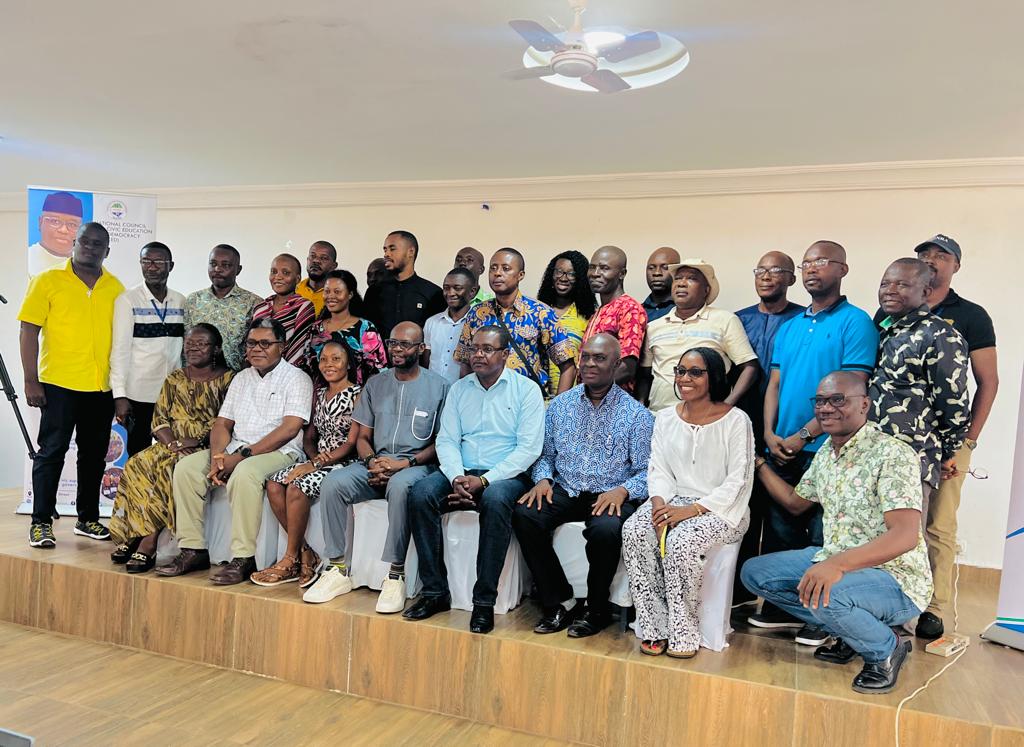By Marilyn King
The Chairman for the National Council for Civic Education and Democracy (NaCCED) Mr. Kalilu I. Totangi, has told colleagues and partners at the NaCCED annual retreat at the Albertson Hotel in Kenema, East of Sierra Leone, that the “key focus of the Council this year will be on Electoral Education targeting young people and other marginalized groups”. “Our role as civic educators”, Mr. Totangi said, “is to help citizens to get as much information as possible, and help them where possible to analyze issues clearly, assess their impacts, and to get them to be interested in participation. “
NaCCED was established in 2018 with the vision to cultivate an engaged, informed and empowered citizenry that will participate in, and contribute to national development. The Chairman believes 2023 is critical and requires all hands on board in getting citizens understand the need to be interested in electoral processes without violence. “We want to focus on young people, we want to do things that are innovative that will get them interested in the electoral process, we want as many young people to make it to the polls and to make informed choices,” he said.
Since its establishment, NaCCED has been pivotal in supporting key engagements of other Ministries, Departments and Agencies (MDAs) to promote national development. One of the Council’s key pillars focuses on “Responding to critical national issues and incidents.” Therefore, Presidential, Parliamentary and Local Council Elections are major issues in Sierra Leone that requires the intervention of the Council. Mr. Totangi is optimistic that constant engagement with the youth can encourage civil behavior and prevent violence during and after the elections. “We want youth to be able to debate the different sides of the election amongst themselves without violence.” He said key strategies will focus on Edutainment, duty bearer dialogue sessions, and partnering with other institutions to develop a youth, and citizens manifestoes.
Speaking on the relevance of youth engagement, the Commissioner for the National Youth Commission Mr. Ngolo Katta who also doubles as a member of NaCCED’s Steering Committee, said recalibrating the mindset of young people in Sierra Leone is fundamental. He referenced the statistics of the current youth population in the country which he said are key players in the upcoming election. “8 out of 10 Sierra Leoneans are below 35 years, out of the almost 4 million voters, 60.4 are between 18 and 35 years. This means that this election will be hinged on the young people of Sierra Leone,” he stated.
Commissioner Katta expressed concern over the involvement of youth in issues of social vices, and therefore reiterated the need for NaCCED’s civic engagement with youth. “NaCCED has a role to play in revamping the mindset of Sierra Leoneans, especially the young people,” he advised. He disclosed that the National Youth Commission will be working with NaCCED to develop a “Youth Manifesto” that will specifically capture the aspirations and expectations of young people in the country post-election.
Speaking on the significance of civic education and youth engagement, the Minister of Information and Communications Mr. Mohamed Rahman Swaray, noted the dire need for civic education nationwide. “We have a citizenry now that is conscious about rights more than anything else. They do not understand that rights have civic responsibilities and limitations based on the rights of other people,” he said. He noted that one way to abuse one’s right is focusing just on the privileges. He admonished the Council to focus on strategies and plans that will address youth violence, drug abuse, especially during this electoral period.
The Development Secretary at the Ministry of Planning and Economic Development, Mr. Peter Sam-Kpakra, acknowledged the effort of the government in reviving civic education in schools. “If you don’t know your right and obligations, you will not be patriotic but rather selfish in your thinking,” he pondered. He applauded NaCCED’s role in translating development communication to Sierra Leoneans. “Government programs need to come to the people in a way that they will understand, and NaCCED has been very proactive in that regard” he said.
The Director of Conflict Resolution at the Independent Commission for Peace and National Cohesion (ICPNC), who also doubles as a Steering Committee Member, Mr. Charles Lahai, admonished NaCCED to step up in its activities based on the recent change of its nomenclature and now an act of Parliament. He also called for and intensified effort to engage Sierra Leoneans during this electoral period stating, “as we get closer to elections there is need for us to ensure that our citizenry is empowered and better informed of the electoral processes and that the safety and security of the state is in our hands.”
The Presidential Governance Adviser, Dr. Emmanuel Gaima, who served as the key facilitator for the retreat, described the establishment of NaCCED as an intentional effort to introduce systems and mechanisms that can contribute to the efficient management of the state. “The President believes that there must be a consistent and structured interface between the Chief Governor and the people that are Governed. If that interface is not deliberately managed, it can lead to misinformation, wrong information and mischievous information,” he said. He emphasized the relevance of the Council, based on its role in bridging the information gap and void between the government and the people.
The two-day retreat also deliberated on internal management systems and procedure reviews, operational guide, as well as structuring the Council’s strategic plan, identifying challenges, and aspirations in its transition as a new Commission.

